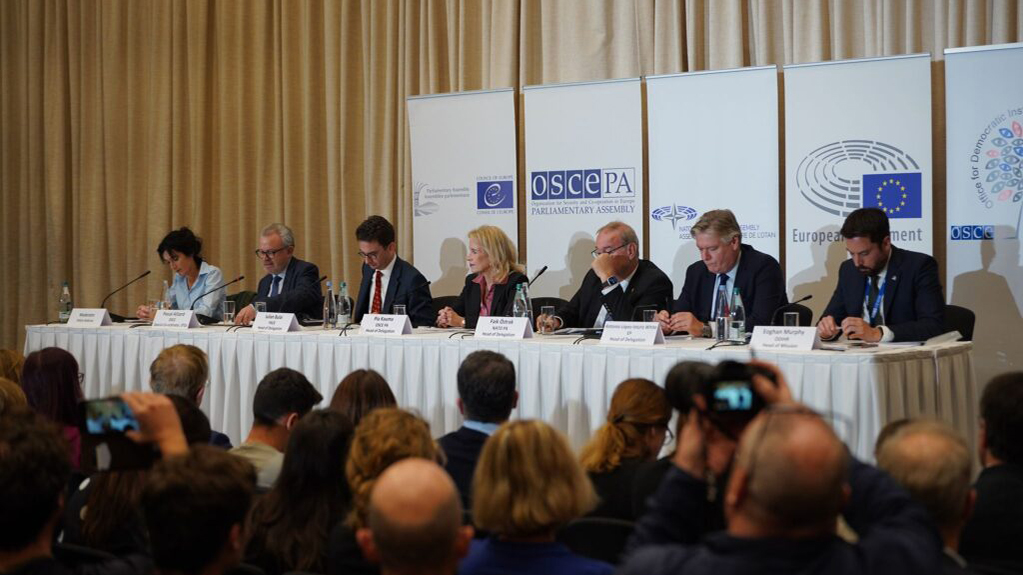The international observation missions from OSCE/ODIHR and PACE have presented their initial assessments of Georgia's parliamentary elections, covering the pre-election period and election day.
News
According to Pascal Allizard, Special Coordinator of the OSCE and Head of the OSCE Short-Term Observers, voting day was procedurally well-administered but marked by a tense environment and numerous cases of intimidation:
“Reports of pressure on voters, particularly on public sector employees, remained widespread in the campaign. This, coupled with extensive tracking of voters on election day, raised concerns about the ability of some voters to cast their vote without fear of retribution,” said Pascal Allizard.
“We were surprised to see cameras in areas not covered by current legislation. Our team of MEPs also observed tension and chaos. In one instance, ballots were stuffed into a box. Additionally, there were instances where observers and media representatives were removed, and complaints from observers were dismissed. Voters faced intimidation both inside and outside polling stations, there was pressure on citizen observers, and the secrecy of the vote was not always maintained.
We also witnessed hostility, intimidation, and other actions on voting day that could undermine the political process in Georgia," said Antonio López-Istúriz, head of the European Parliament delegation.
“A tense, deeply polarized environment, instances of voter intimidation and pressure outside polling stations, breaches of vote secrecy, an uneven playing field, and divisive rhetoric – these issues have been deeply concerning to me personally," stated Faik Öztrak, head of the NATO Parliamentary Assembly delegation, regarding the October 26 parliamentary elections. According to him, these elections were a critical test for Georgia's democracy, with the results themselves as a second test.
“During our observation, we saw cases of voter bribery and double voting before and during election day, especially in rural areas. It was as if we observed two different worlds: inside the polling stations, where the process was well-administered, and outside, where the conditions were entirely different.
The presence of ruling party cameras in front of polling stations and the registration of voters created a pressuring environment, with organized intimidation by the party, making it feel as though 'Big Brother' was watching.
These were the observations of one of our monitors. Unequal conditions and procedural issues undermined the credibility and fairness of the results. When we observed the elections in rural areas, the car of one of our observers was vandalized,” said Julian Bulai, head of the delegation from the Parliamentary Assembly of the Council of Europe.
Members of the international observation mission also summarized the pre-election period.
- “There was polarization and an environment significantly impacted by recently passed legislation;
- Candidates were generally able to campaign freely; however, campaign rhetoric and imagery were often highly divisive.
- It is important to note that the considerable imbalance in financial resources and the dominance of the ruling party created an uneven playing field.
- The polarized media environment, as well as the instrumentalization of private media outlets for political propaganda, affected unbiased coverage and hindered voters' ability to make informed choices.
- The effectiveness of campaign finance oversight was weakened by limited enforcement, and there were lingering suspicions of political instrumentalization of the oversight body, raising doubts about its impartiality.
- Additionally, the underrepresentation of women on party lists and in campaigns indicates that further efforts are needed to more adequately involve women in political life,” said the OSCE Special Coordinator.
According to Owen Murphy, head of the OSCE/ODIHR observation mission, the mission has had 30 long-term observers since September 19. “We also monitored social media campaigns, which are not subject to regulation. Representatives from both ruling and opposition parties mentioned instances of attacks. Intimidation, pressure, and coercion were noted throughout the period, particularly affecting public sector employees and economically vulnerable individuals. This raises questions about the extent to which some voters could vote freely and without fear, contrary to OSCE commitments and international standards. The ruling party held a substantial financial advantage over other competitors.
From September 18 to October 25, we conducted quantitative and qualitative monitoring of six TV channels and two online media outlets. This monitoring revealed media bias across all examples. The public broadcaster devoted significantly more airtime to the ruling party, and political leaders’ refusal to participate in debates added to the challenging environment,” said the head of the OSCE/ODIHR monitoring mission.
OSCE Special Coordinator Pascal Alizard expressed hope that “the leadership elected yesterday will effectively address the key challenges facing this country and will bring Georgia closer to its goals related to joining the European Union.”















